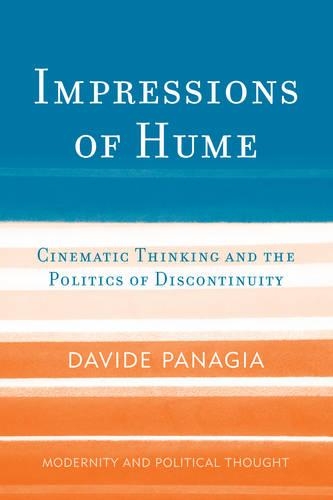
Impressions of Hume: Cinematic Thinking and the Politics of Discontinuity
(Paperback)
Publishing Details
Impressions of Hume: Cinematic Thinking and the Politics of Discontinuity
By (Author) Davide Panagia
Bloomsbury Publishing PLC
Rowman & Littlefield Publishers
25th July 2016
United States
Classifications
Professional and Scholarly
Non Fiction
Political science and theory
321.8
Physical Properties
Paperback
188
Width 153mm, Height 224mm, Spine 14mm
295g
Description
Davide Panagias Impressions of Hume: Cinematic Thinking and the Politics of Discontinuity is volume fifteen of Modernity and Political Thought, the Rowman & Littlefield series in contemporary political theory. Through close attention to Humes theories of sensation, Davide Panagia conceptualizes the modern even more radically (though also more literally) than many of the previous authors in this series. While devoting attention to how a historical thinker such as Hume is read and misread, used and abused in the modern intellectual world, Panagia also focuses on developing a theory of Humean perception and by so doing emphasizes the contemporaneity of Humes thought. In what at first seems to be an anachronistic as well as wildly curious claim about a philosopher of the eighteenth century, Panagia holds that Hume was a cinematic thinker.
Reviews
Davide Panagia has offered a very important contribution to Hume scholarship that promises to show the relevance of Hume to a number of contemporary debates and discussions. * Theory & Event *
In a terse and vivid reading Panagia affiliates Humes Treatise with the experience of cinema: evanescent, kaleidoscopic, flickering, forever unsettling. Resisting regulation or consensus, Humes writings on sensation enable us to put an aesthetic of film in the service of a politics. A committed and sustained reflection on every page, Impressions offers a pragmatic and historically informed treatment of philosophy and cinema. -- Tom Conley, Department of Romance Languages, Harvard University
Author Bio
Davide Panagia is a political and cultural theorist who holds the Canada Research Chair in Cultural Studies at Trent University. He is the Co-Editor of the cultural and political theory journal, Theory & Event, and is a contributor to The Contemporary Condition.
